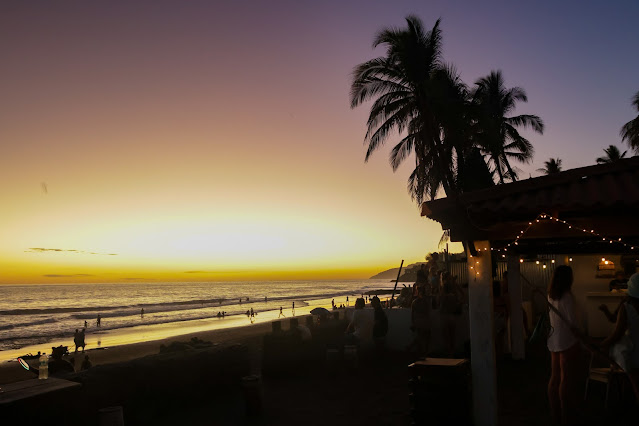“A few years ago, you couldn’t be here” the Salvadoran taxi driver told me, as we rattled through the colourful, crumbling streets of Santa Ana.
“You see that?” he asked, wide-eyed, pointing towards a young woman walking alone, eyes glued to her phone. “A few years ago that would not have been safe. Not possible”. It was as if he couldn’t quite believe what he was seeing. The people of El Salvador are riding a wave. There's a sense of newfound safety and it's largely credited to one man: President Nayib Bukele.
“So, you support what the president is doing?” I asked - already anticipating the answer - and he almost crashed the car into an oncoming chicken bus, such was the enthusiasm of his response.
 |
| © Ryan Chapman |
His so-called miracle? Turning El Salvador from one of the world’s most dangerous countries into one of the safest in Latin America. From a country where murders were commonplace to one where people genuinely feel safe. In just a few years.
But of course, there’s a catch.
I’d heard the headlines, but it was a guy called Hector who filled in the story during a walking tour of Santa Ana. Hector, in his early 20’s, is bright-eyed, tattooed, and brimming with pride for his hometown. But five years ago, he fled it. Four of his five best friends had been murdered, and he had every reason to believe he was next.
 |
| © Ryan Chapman |
But here’s the thing: most of those people have never had a trial. And Amnesty International estimates that around a third of them are innocent.
Still, with gang members either locked up or lying low, Hector felt it was safe enough to return to an increasingly gringo-friendly Santa Ana to start his walking tour business. And survival is no longer his only goal. Now, he wants to make enough money from tours to open a bar. Because as much as he loves tattoos and storytelling, he loves tequila and dancing more.
But he also lives with a risk. Bukele’s trawler net approach means more innocent people will be jailed. Wrong street? Wrong tattoo? Wrong time? Anybody could vanish at any moment.
“Somebody could call the gang hotline today, and tomorrow I’ll be gone” Hector told me as we walked through the striking neo-Gothic cathedral. That hotline however, meant to collect anonymous tips, is sometimes used to settle personal vendettas. And not only that, there’s one gang-like tattoo in particular on Hector’s leg that has nearly gotten him arrested on more than one occasion. He’s playing with fire every time he wears shorts.
I probed Hector gently on Bukele’s human rights abuses. “Human rights?” he scoffed. “What human rights?”. It wasn’t defiance, it was resignation. He knows freedoms are being sacrificed, but for many - and I suspected for Hector, too - it’s a price worth paying.
After a few days I left the grittiness of Santa Ana behind and wound my way into the mountains.
 |
| © Ryan Chapman |
I visited every sleepy village on the scenic Ruta de las Flores (Route of the Flowers) and drank more coffee than was probably wise, fuelling further hikes to hidden waterfalls and more volcanic crater lakes.
 |
| © Ryan Chapman |
 |
| © Ryan Chapman |
As part of Bukele’s grand vision to reinvent El Salvador, he had recently made Bitcoin an official currency. And while only a tiny - and shrinking - fraction of Salvadorans actually used it, this coastal enclave had become a haven for crypto bros. I witnessed a man wearing an “I ❤️Bitcoin” t-shirt attempting to pay for bananas at a roadside stall with cryptocurrency.
The vast majority of the population don’t have a bank account, let alone a crypto wallet. And according to a recent poll, only 15% of the population even trust Bitcoin as a currency. I overheard the banana guy ask his friend if he had any dollars on him, and I couldn’t resist a sassy comment as I walked past: “Cash is king, eh?”
I passed the time in El Zonte consuming copious amounts of grilled fish and pupusas, washed down with either coffee or margaritas, depending on the time of day. Occasionally I'd spend twenty minutes in the ocean letting waves knock me over, and then I'd find a spot to dry and read a book before doing it all over again.
 |
| © Ryan Chapman |
“The miracle has come with a price though” he said, gesturing towards the homes around us. “Every one of those families has lost someone. Many innocent people are locked up to make this happen”.
It’s no surprise then, that Bukele has his critics. Like the outspoken lawyer who called him a dictator on live TV earlier this month. She’s since been arrested, which if nothing else, rather proves her point. But her remarks echoed something Bukele once said about himself, when he updated his Twitter bio to: “The world’s coolest dictator 😎”. Satire? Probably. A red flag? Certainly.
 |
| © Ryan Chapman |
It’s hard, from a European perspective, to grasp just how bad things were in El Salvador before President Bukele came along. That’s why it’s equally hard to judge the extreme measures being taken to fix them.
I was only in El Salvador for a short while - a side trip, really, following a few glorious weeks in neighbouring Guatemala - but I glimpsed a nation gripped by transformation and driven by hope. Go, and not only will you find warm smiles and exceptional coffee, you’ll witness a complicated story unfolding in real time.
No comments:
Post a Comment